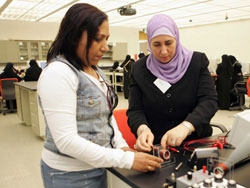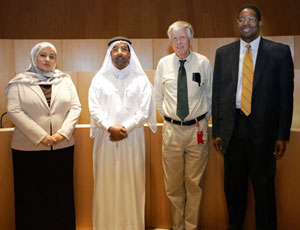December,2007

Jaya Koshy (left) and Amal Kanan explore
alternating current (AC) circuits at the fourth
WCMC-Q physics workshops. The teachers
are practicing physics skills they will use in
interactive learning with students at
Al Bayan Educational Complex for Girls.
Piece by piece, part by part, high school teachers explored the inner workings of human-powered flashlights during a physics workshop at Weill Cornell Medical College Qatar last week.
The workshop was the fourth in a highly successful series of collaborations between Weill Cornell, Qatar University and the Qatar Physics Society. It included a presentation by Qatargas Utility Inlet and Off-site General Commissioning Lead (Qatargas 2) Nasser M. Al-Issa on Applications of Science in Engineering.
Designed for high school teachers of physics in independent and Government schools, the workshops encourage teachers to practise interactive learning with students.
“They (the teachers) are highly motivated and they pass this motivation and excitement on to their students,” says WCMC-Q Physics Professor and workshop co-ordinator, Roger Hinrichs.
This type of educational drive for interactive learning, problem-solving, and critical thinking is a key component of Qatar’s emphasis on innovative learning and Qatar’s development of a knowledge-based economy and society.

At the fourth physics workshops held in laboratories at
WCMC-Q from left to right: Dr Ilham Al-Qaradawi,
Physics Professor Qatar University and Physics
Workshops Co-Coordinator; Nasser Al-Issa,Utility,
Inlet and Off-site General Commissioning Lead (Qatargas 2);
Dr Roger Hinrichs Physics Professor WCMC-Q and
Physics Workshop Coordinator, and Mr Keith
Felton, Technical Advisor (Qatargas 2).
“We know that if the teachers have fun with learning their students will have fun with learning and the benefits will be visible in better university students and productive research. Hopefully this will propel Qatar further ahead.”
“Active learning involves students in constructing their own understanding of concepts based on discovery and critical thinking,” he says. “There is a clear desire from the participating teachers to learn how to solve problems so they can encourage problem-solving in students.”
The Workshops began in 2006 following visits to high schools by Professor Hinrichs and workshop co-director Professor Ilham Al-Qaradawi from Qatar University. The workshops are split into mainly male and female sessions.
The first workshop was held at WCMC-Q in 2006, the second at Qatar University in the same year and the third at Omar bin al-Khattab School for boys in 2007. In those earlier workshops the teachers received ‘hands on’ laboratory practice in electricity, optics and magnetism.
During last week’s workshop sessions the teachers also received something extra - a small hand-powered flashlight.
“They took their flashlight apart and put it back together piece by piece so they could explore alternating current (AC) circuits and understand them,” says Dr Hinrichs.
Report by Jane England
